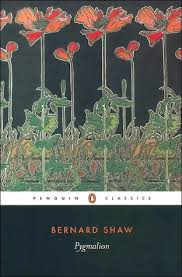Pygmalion Page #3
Pygmalion is a play by George Bernard Shaw, named after a Greek mythological figure. It was first presented on stage to the public in 1913. In ancient Greek mythology, Pygmalion fell in love with one of his sculptures, which then came to life.
An elderly gentleman of the amiable military type rushes into shelter, and closes a dripping umbrella. He is in the same plight as Freddy, very wet about the ankles. He is in evening dress, with a light overcoat. He takes the place left vacant by the daughter's retirement. THE GENTLEMAN. Phew! THE MOTHER [to the gentleman] Oh, sir, is there any sign of its stopping? THE GENTLEMAN. I'm afraid not. It started worse than ever about two minutes ago. [He goes to the plinth beside the flower girl; puts up his foot on it; and stoops to turn down his trouser ends]. THE MOTHER. Oh, dear! [She retires sadly and joins her daughter]. THE FLOWER GIRL [taking advantage of the military gentleman's proximity to establish friendly relations with him]. If it's worse it's a sign it's nearly over. So cheer up, Captain; and buy a flower off a poor girl. THE GENTLEMAN. I'm sorry, I haven't any change. THE FLOWER GIRL. I can give you change, Captain, THE GENTLEMEN. For a sovereign? I've nothing less. THE FLOWER GIRL. Garn! Oh do buy a flower off me, Captain. I can change half-a-crown. Take this for tuppence. THE GENTLEMAN. Now don't be troublesome: there's a good girl. [Trying his pockets] I really haven't any change--Stop: here's three hapence, if that's any use to you [he retreats to the other pillar]. THE FLOWER GIRL [disappointed, but thinking three halfpence better than nothing] Thank you, sir. THE BYSTANDER [to the girl] You be careful: give him a flower for it. There's a bloke here behind taking down every blessed word you're saying. [All turn to the man who is taking notes]. THE FLOWER GIRL [springing up terrified] I ain't done nothing wrong by speaking to the gentleman. I've a right to sell flowers if I keep off the kerb. [Hysterically] I'm a respectable girl: so help me, I never spoke to him except to ask him to buy a flower off me. [General hubbub, mostly sympathetic to the flower girl, but deprecating her excessive sensibility. Cries of Don't start hollerin. Who's hurting you? Nobody's going to touch you. What's the good of fussing? Steady on. Easy, easy, etc., come from the elderly staid spectators, who pat her comfortingly. Less patient ones bid her shut her head, or ask her roughly what is wrong with her. A remoter group, not knowing what the matter is, crowd in and increase the noise with question and answer: What's the row? What she do? Where is he? A tec taking her down. What! him? Yes: him over there: Took money off the gentleman, etc. The flower girl, distraught and mobbed, breaks through them to the gentleman, crying mildly] Oh, sir, don't let him charge me. You dunno what it means to me. They'll take away my character and drive me on the streets for speaking to gentlemen. They-- THE NOTE TAKER [coming forward on her right, the rest crowding after him] There, there, there, there! Who's hurting you, you silly girl? What do you take me for? THE BYSTANDER. It's all right: he's a gentleman: look at his boots. [Explaining to the note taker] She thought you was a copper's nark, sir. THE NOTE TAKER [with quick interest] What's a copper's nark? THE BYSTANDER [inept at definition] It's a--well, it's a copper's nark, as you might say. What else would you call it? A sort of informer. THE FLOWER GIRL [still hysterical] I take my Bible oath I never said a word-- THE NOTE TAKER [overbearing but good-humored] Oh, shut up, shut up. Do I look like a policeman? THE FLOWER GIRL [far from reassured] Then what did you take down my words for? How do I know whether you took me down right? You just show me what you've wrote about me. [The note taker opens his book and holds it steadily under her nose, though the pressure of the mob trying to read it over his shoulders would upset a weaker man]. What's that? That ain't proper writing. I can't read that. THE NOTE TAKER. I can. [Reads, reproducing her pronunciation exactly] "Cheer ap, Keptin; n' haw ya flahr orf a pore gel." THE FLOWER GIRL [much distressed] It's because I called him Captain. I meant no harm. [To the gentleman] Oh, sir, don't let him lay a charge agen me for a word like that. You-- THE GENTLEMAN. Charge! I make no charge. [To the note taker] Really, sir, if you are a detective, you need not begin protecting me against molestation by young women until I ask you. Anybody could see that the girl meant no harm. THE BYSTANDERS GENERALLY [demonstrating against police espionage] Course they could. What business is it of yours? You mind your own affairs. He wants promotion, he does. Taking down people's words! Girl never said a word to him. What harm if she did? Nice thing a girl can't shelter from the rain without being insulted, etc., etc., etc. [She is conducted by the more sympathetic demonstrators back to her plinth, where she resumes her seat and struggles with her emotion]. THE BYSTANDER. He ain't a tec. He's a blooming busybody: that's what he is. I tell you, look at his boots. THE NOTE TAKER [turning on him genially] And how are all your people down at Selsey? THE BYSTANDER [suspiciously] Who told you my people come from Selsey? THE NOTE TAKER. Never you mind. They did. [To the girl] How do you come to be up so far east? You were born in Lisson Grove. THE FLOWER GIRL [appalled] Oh, what harm is there in my leaving Lisson Grove? It wasn't fit for a pig to live in; and I had to pay four-and-six a week. [In tears] Oh, boo--hoo--oo-- THE NOTE TAKER. Live where you like; but stop that noise. THE GENTLEMAN [to the girl] Come, come! he can't touch you: you have a right to live where you please. A SARCASTIC BYSTANDER [thrusting himself between the note taker and the gentleman] Park Lane, for instance. I'd like to go into the Housing Question with you, I would. THE FLOWER GIRL [subsiding into a brooding melancholy over her basket, and talking very low-spiritedly to herself] I'm a good girl, I am. THE SARCASTIC BYSTANDER [not attending to her] Do you know where I come from? THE NOTE TAKER [promptly] Hoxton. Titterings. Popular interest in the note taker's performance increases. THE SARCASTIC ONE [amazed] Well, who said I didn't? Bly me! You know everything, you do. THE FLOWER GIRL [still nursing her sense of injury] Ain't no call to meddle with me, he ain't. THE BYSTANDER [to her] Of course he ain't. Don't you stand it from him. [To the note taker] See here: what call have you to know about people what never offered to meddle with you? Where's your warrant? SEVERAL BYSTANDERS [encouraged by this seeming point of law] Yes: where's your warrant? THE FLOWER GIRL. Let him say what he likes. I don't want to have no truck with him. THE BYSTANDER. You take us for dirt under your feet, don't you? Catch you taking liberties with a gentleman! THE SARCASTIC BYSTANDER. Yes: tell HIM where he come from if you want to go fortune-telling. THE NOTE TAKER. Cheltenham, Harrow, Cambridge, and India. THE GENTLEMAN. Quite right. [Great laughter. Reaction in the note taker's favor. Exclamations of He knows all about it. Told him proper. Hear him tell the toff where he come from? etc.]. May I ask, sir, do you do this for your living at a music hall?
Translation
Translate and read this book in other languages:
Select another language:
- - Select -
- 简体中文 (Chinese - Simplified)
- 繁體中文 (Chinese - Traditional)
- Español (Spanish)
- Esperanto (Esperanto)
- 日本語 (Japanese)
- Português (Portuguese)
- Deutsch (German)
- العربية (Arabic)
- Français (French)
- Русский (Russian)
- ಕನ್ನಡ (Kannada)
- 한국어 (Korean)
- עברית (Hebrew)
- Gaeilge (Irish)
- Українська (Ukrainian)
- اردو (Urdu)
- Magyar (Hungarian)
- मानक हिन्दी (Hindi)
- Indonesia (Indonesian)
- Italiano (Italian)
- தமிழ் (Tamil)
- Türkçe (Turkish)
- తెలుగు (Telugu)
- ภาษาไทย (Thai)
- Tiếng Việt (Vietnamese)
- Čeština (Czech)
- Polski (Polish)
- Bahasa Indonesia (Indonesian)
- Românește (Romanian)
- Nederlands (Dutch)
- Ελληνικά (Greek)
- Latinum (Latin)
- Svenska (Swedish)
- Dansk (Danish)
- Suomi (Finnish)
- فارسی (Persian)
- ייִדיש (Yiddish)
- հայերեն (Armenian)
- Norsk (Norwegian)
- English (English)
Citation
Use the citation below to add this book to your bibliography:
Style:MLAChicagoAPA
"Pygmalion Books." Literature.com. STANDS4 LLC, 2025. Web. 4 Feb. 2025. <https://www.literature.com/book/pygmalion_78>.








Discuss this Pygmalion book with the community:
Report Comment
We're doing our best to make sure our content is useful, accurate and safe.
If by any chance you spot an inappropriate comment while navigating through our website please use this form to let us know, and we'll take care of it shortly.
Attachment
You need to be logged in to favorite.
Log In